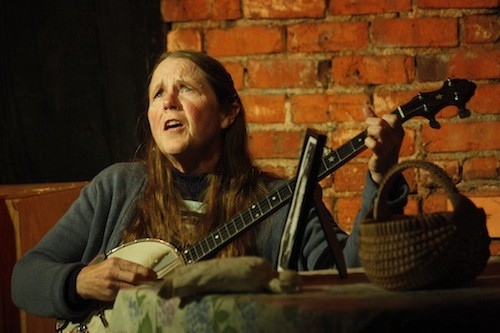Friday, November 22, 2013
Arts Theater review: Precious Memories
Posted By Perry Tannenbaum on Fri, Nov 22, 2013 at 4:42 PM
For the second time in 26 years, I sat next to Gina Stewart at a theatre event last Sunday evening. We had decent seats the first time at old Rowe Theatre on the UNC Charlotte campus in 1987, but these were better, front row at the Evening Muse as we watched Sue Massek performing Precious Memories, the one-woman show by Si Kahn celebrating the life and music of Sarah Ogan Gunning - with a couple of grudging nods to Gunning's more famous half-sister, folksinger and union activist Aunt Molly Jackson.
The half-sibs were linked throughout the 85-minute show, for it's set in a Detroit tenement where Gunning was living in obscurity on September 4, 1960, the day Jackson was buried in faraway Sacramento, three days after her death. As Sarah sifts through Molly's artifacts in a quaint old metal box that has arrived in the mail, she props up a photo on a small end table within arm's length of her rocking chair. With the key addition of an open-back banjo, those are all the props needed for Sarah to take us through the siblings' music, intertwining stories, and their lifelong quarrels and rivalry.
When Massek wasn't picking and singing, she was either talking to the audience or that grim looking photo of her talented, driven, mean-ass sister. Massek performs creditably enough either way, yet I couldn't help feeling as she sulked or scolded Molly's photo, "Now this must be a role that Gina is itching to do." For the spasmodic rhythms of Massek's speech, the wee pauses that stalled her momentum, wouldn't be problems for Stewart, who portrayed Maybelle Carter so memorably six years ago in Wildwood Flowers: The June Carter Cash Musical.
But when Massek shouldered her banjo or poured her heart out to the audience, she was fabulous - precisely because her singing and storytelling lacked the artifice that would have helped so much as she raged against Molly. You could believe that we were watching a national treasure whose aspirations and self-confidence rotted away in obscurity while her singing, songwriting, and banjo playing talents remained undimmed.
And what harrowing stories she had to tell us about the lives - and deaths from TB and black lung - of oppressed miners under the thumb of union-busting companies in a Kentucky coal town. Appalling and infuriating. These testimonies added the soul and suffering behind Gunning's unionizing anthems that made their plucky resolve all the more inspiring.
Although Kahn could have tailored his script more closely to Massek's strengths, Precious Memories is bristling with power, a history lesson with pointed relevance. Now that Kahn is settling into Charlotte, it's exciting to think about all the other stage works he may dust off and present in his hometown.














